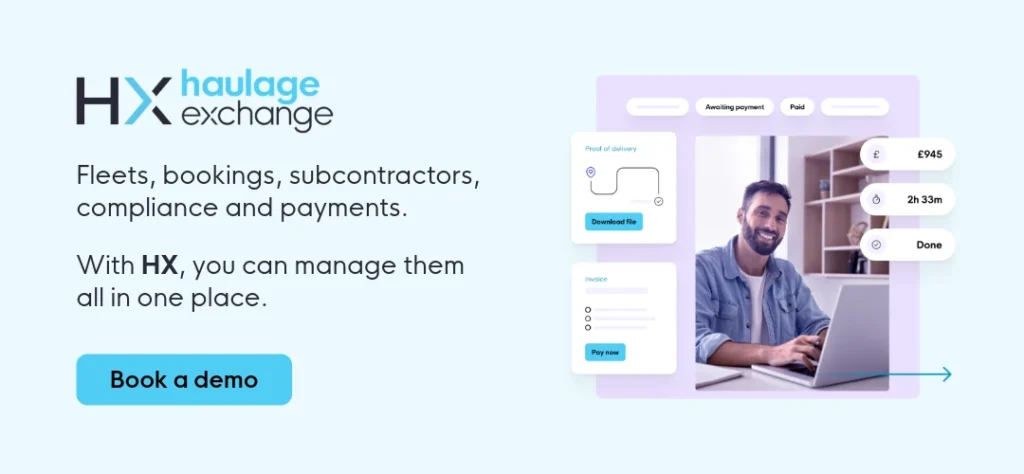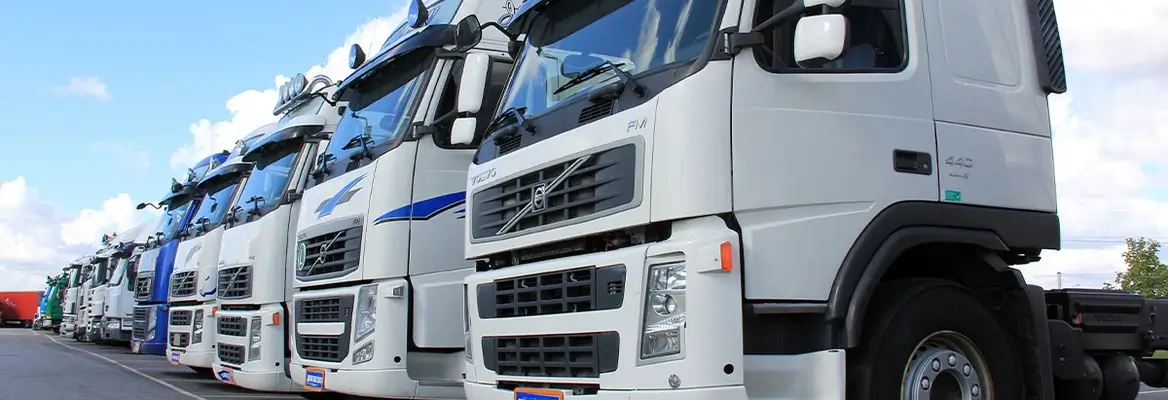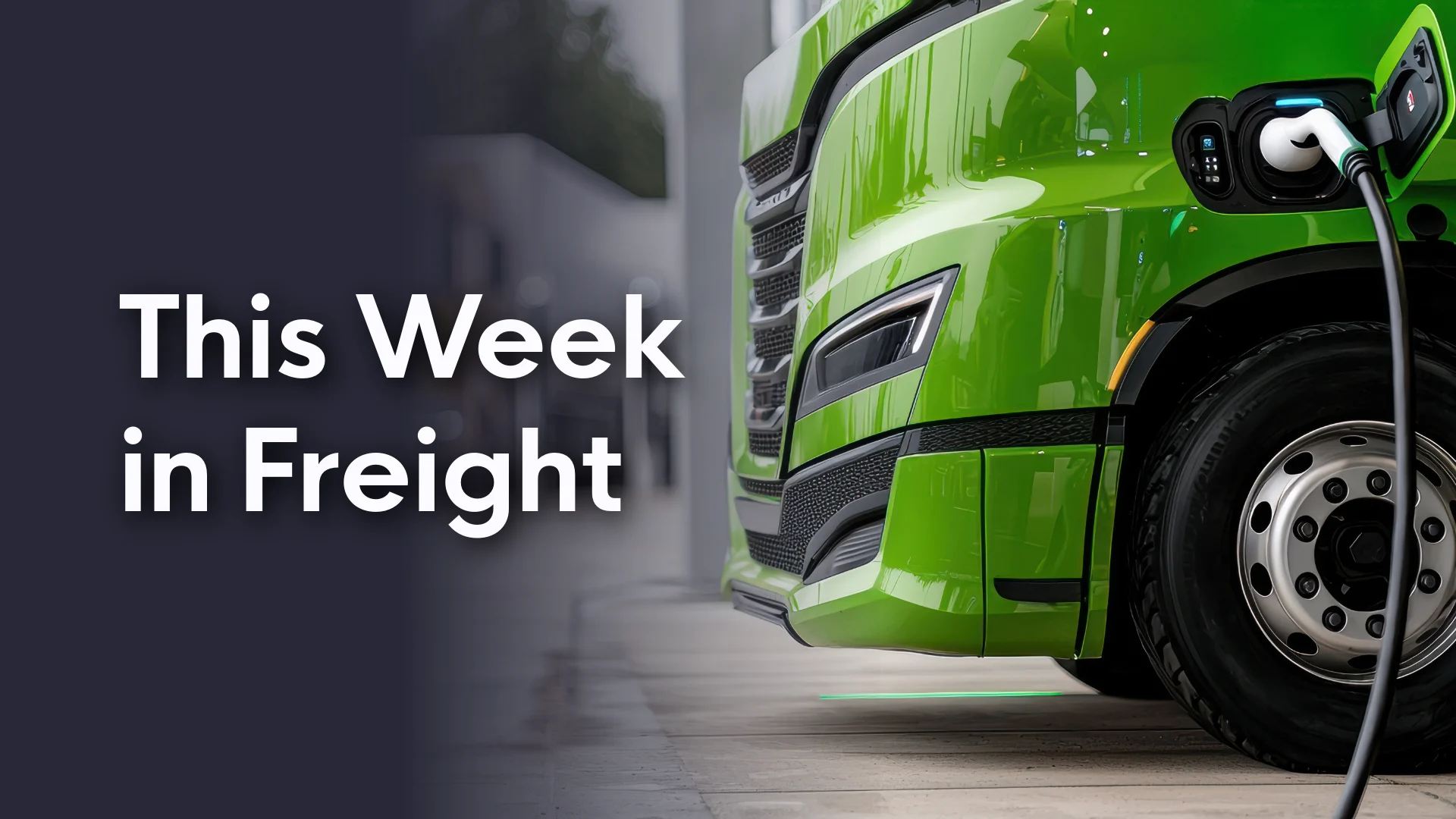Thinking of starting a haulage company? You’re not alone. Each year, new operators enter the industry—some are owner-drivers branching out, others are newcomers to logistics.
The good news: you don’t need a huge fleet or depot to begin. Many haulage firms start with a single truck and grow steadily. But success requires careful planning, compliance knowledge, and a clear understanding of costs.
This guide takes you through each step, updated with the latest figures and regulations for 2025.
What we’ll cover
Fleets, bookings, subcontractors, compliance & payments.
With HX, you can manage them all in one place.
The UK and EU haulage market in 2025
The industry is changing fast. Knowing the main challenges and opportunities will help you prepare.
Driver shortages
The UK still has a shortage of around 50,000 HGV drivers (Logistics UK, 2024).
This makes it harder and more expensive to find drivers, especially for large HGVs. Other European countries face the same issue.
Fuel and alternatives
Diesel is still the main fuel, but prices are unpredictable. Between 2022 and 2024, UK diesel prices rose by around 12%.
Some firms are trying HVO fuel, biomethane, or electric HGVs and electric courier vans, but these are still limited for small operators.
Environmental rules
More cities now have Clean Air Zones and stricter HGV emissions regulations.
In London, the ULEZ covers a wide area. Similar rules are being introduced across the EU.
This may affect which vehicles you buy and where you can work.
Freight demand
UK road freight carried 1.44 billion tonnes of goods in 2023 (DfT).
Growth is steady, with online shopping keeping demand for parcel and pallet delivery strong.
Technology use
Digital tools like fleet management software, smart tachographs, and platforms such as Haulage Exchange are now common.
They help reduce empty miles, manage compliance, and save admin time.
Step 1: Identify your niche
The haulage industry is wide. Picking a focus helps you stand out and win work. Many customers look for specialist freight services.
Examples include:
- Retail and parcel deliveries
- Construction loads with bulk transport and walking floor trailers
- Waste removal (needs a waste carrier license)
- ADR freight (hazardous goods) with a Dangerous Goods Safety Adviser
- Livestock and farm goods
- Airport deliveries needing cargo operative certification
Research your market. Some areas, like ADR or temperature-controlled loads, often pay more than general haulage.
Step 2: Decide on your fleet size and vehicle type
Most firms begin small. The RHA (2024) says 89% of UK hauliers run fewer than 10 vehicles. Many London haulage companies have only one to five trucks.
When choosing vehicles, think about:
- Buying, leasing, hire purchase, or short-term rental
- Fuel type: diesel, HVO, electric, biomethane
- Size: van, rigid, or articulated HGV
- Driver availability: easier to find drivers for smaller trucks
You need an operator’s license if your vehicles are over 3.5 tonnes.
Buying vs leasing comparison
| Option | Pros | Cons |
|---|---|---|
| Buy | Own the asset, no mileage limits | High upfront cost, loses value over time |
| Lease | Low start cost, newer vehicles | Ongoing payments, usage limits |
| Hire purchase | Own vehicle after paying | Higher overall cost, fixed terms |
| Short-term rental | Flexible, good for testing work | Higher weekly cost, no ownership |
For more detail, see our guide on UK lorry sizes.

Step 3. Choose the right location
Your base affects cost and efficiency. Here are some factors to consider when choosing a location:
- Proximity to major roads and motorways – Easy access to transport routes helps with efficiency and fuel costs.
- Cost of rent or purchase – Prices vary by region, so balance affordability with accessibility. Depots in London average £18–20 per sq. ft., compared to £6–7 in the North East
- Availability of parking and loading space – Sufficient space for HGVs, trailers, and loading/unloading is essential, as well as good yard management.
- Local planning regulations – Some areas have restrictions on commercial vehicle depots.
- Proximity to customers and suppliers – Being near major clients or distribution centres can reduce travel time.
- Security and crime rates – Locations with higher theft risks may require additional security investment, such as using secure truck parking.
- Access to fuel stations and service centres – Keeping your HGVs maintained is easier with nearby facilities.
- Local workforce availability – If hiring haulage drivers, being near a skilled workforce is a bonus.
- ULEZ and clean air zones – If operating in or near cities, consider the impact of HGV emissions regulations.
Taking the time to choose the right location when starting a haulage company can reduce costs, improve efficiency, and support long-term growth for your haulage business.
Step 4. Work out your start-up and running costs
Even after finding a suitable location, there is more to think about before you sign on the dotted line.
It’s really important not to make any final decisions until you’ve taken into account all of the necessary considerations, and these include any regular costs you’ll be running.
One-off costs
- Vehicle purchase or lease
- Yard or depot set-up
- Licences such as an operator’s license or waste carrier license
Ongoing costs
- Fuel (prices up 12% between 2022–24)
- HGV insurance (premiums up 12% since 2022)
- HGV Driver CPC training
- Maintenance and tyres
- Staff wages
- HGV road tax
- Systems such as fleet management tools
Example monthly costs for one lorry
| Expense | Approx. monthly cost |
|---|---|
| Fuel (10,000 miles) | £3,500–£4,000 |
| Insurance | £600–£900 |
| Maintenance/tyres | £400–£600 |
| Vehicle finance/lease | £1,000–£1,400 |
| Road tax | £100–£120 |
| Admin/compliance | £150–£250 |
| Total | £5,750–£7,200 |
Step 5. Understand your legal and compliance requirements
Running a haulage company isn’t just about trucks and loads, it’s about staying compliant with the law.
The transport sector is highly regulated, and for good reason: it keeps roads safe, protects drivers, and ensures fair competition.
If you’re planning to enter the market, you’ll need to understand these rules from the very start.
To run legally you must:
- Hold an operator’s license if vehicles are over 3.5t
- Employ or act as qualified transport managers (CPC holders)
- Arrange insurance – specialist insurance from providers like Business Choice Direct
- Follow tachograph legislation – smart tachographs are now required in new trucks
- Comply with cabotage laws if you plan to carry goods across EU borders
- Have a DGSA if you handle ADR freight
These requirements might feel like a lot, but they form the backbone of every professional haulage operation.
Keeping your paperwork, licences, and safety measures in order not only avoids fines and penalties, but also makes you more attractive to shippers who want reliable partners.
Think of compliance as your licence to trade after stating a haulage company. Once you have these essentials in place, you can focus on winning loads and building your business with confidence.
Step 6. Plan your funding and finance options
Starting a haulage business can be expensive, and most new operators don’t have the cash to pay for everything upfront.
The good news is there are several finance routes available, from bank loans to specialist HGV finance and leasing. Choosing the right option will depend on your cash flow, long-term goals, and appetite for risk.
Common options include:
- Asset finance – spread the cost of vehicles
- Hire purchase – own the truck once you’ve finished paying
- Leasing – predictable monthly costs, no ownership
- Government Start Up Loans – unsecured loans of up to £25,000
- Invoice financing – get paid faster by releasing funds tied up in invoices
Interest rates for asset finance currently sit between 6–12%. Using Haulage Exchange to secure steady work early on can also strengthen your credit profile, making it easier to access finance later.
By planning your funding carefully, you’ll avoid cash-flow surprises and ensure your business is sustainable from the start.
Step 7. Use technology to support your business
The haulage industry has changed. Today, technology isn’t just for big fleets, it’s available and affordable for smaller operators too. Using the right tools when starting a haulage company will save you time, reduce costs, and make it easier to stay compliant.
Useful tools include:
- Fleet management software for maintenance schedules and compliance checks
- Telematics for real-time routing and fuel monitoring
- Tachograph downloads to stay in line with tachograph rules
- Invoicing platforms to handle payments faster
Some insurers even offer reduced insurance premiums if you can show you’re using telematics to manage risk.
Think of technology as an extra team member: one that never sleeps and helps you keep control of your business as it grows.
Step 8. Grow your customer base with a freight exchange
Finding customers is one of the hardest parts of starting a haulage business. Large contracts can take time to win, and word of mouth builds slowly.
A freight exchange like Haulage Exchange gives you immediate access to work, helping you keep your trucks moving while you build long-term relationships.
Benefits include:
- Over 15,000 loads available daily
- Return loads to reduce empty miles
- Subcontracting options with vetted partners
- Digital invoicing and payments
- Building your reputation with shippers
Many operators use exchanges in their first year to stay busy and profitable, while gradually securing direct clients. Even established hauliers keep them as a safety net.
A freight exchange isn’t just a stopgap, it’s a proven way to connect with trusted partners and grow your customer base quickly.
Wrapping up
Starting a haulage company takes more than just buying a truck—it’s about building a business that can stand the test of time. That means planning your finances carefully, using technology to stay compliant and efficient, and finding reliable customers to keep your wheels turning.
By setting a solid foundation in these three areas, you’ll avoid many of the common setbacks new operators face. With tools like fleet management software, the right funding choices, and platforms such as Haulage Exchange to win loads, even small firms can compete in a busy market.
With the right preparation, you can launch with confidence, grow steadily, and turn your haulage business into a long-term success.
FAQs about starting a haulage company
How much does it cost to start a haulage company?
The costs to start a haulage company in the UK can vary widely depending on your fleet size, location, and niche. On average, initial costs can range from £20,000 to £50,000 for a small operator. This includes vehicle purchase or leasing, insurance, licencing fees, premises, and ongoing operational expenses like fuel and maintenance.
Do I need an operator’s licence?
Yes, you must apply for a Goods Vehicle Operator’s Licence if you plan to operate vehicles over 3.5 tonnes. This licence is issued by the Traffic Commissioner and includes requirements such as demonstrating financial standing, vehicle maintenance systems, and compliance with drivers’ hours rules.
Can I run a haulage business with just one lorry?
Absolutely, many owners start a haulage company with a single vehicle. As your contracts and workload grow, you can gradually expand your fleet and operational capacity, or subcontract the extra work on Haulage Exchange.
What insurance does a haulage business need?
To start a transport company, you’ll require Goods in Transit insurance, public liability insurance, and HGV insurance as a minimum. If you hire staff, employer’s liability insurance is also compulsory. Optional covers like professional indemnity can also protect you if you offer additional services, like ADR haulage.
Can I run a haulage company from home?
It’s possible to start a trucking company from home, especially when you’re working as an owner-operator. You’ll still need space to park your lorry and meet local planning regulations, but many operators work from home before moving to dedicated depots as their business grows.
What qualifications do I need to run a haulage business?
To legally start a haulage company, you need a Transport Manager Certificate of Professional Competence (CPC) or access to someone who holds one. This ensures your company complies with regulations covering fleet operations, driver safety, and working time rules.




